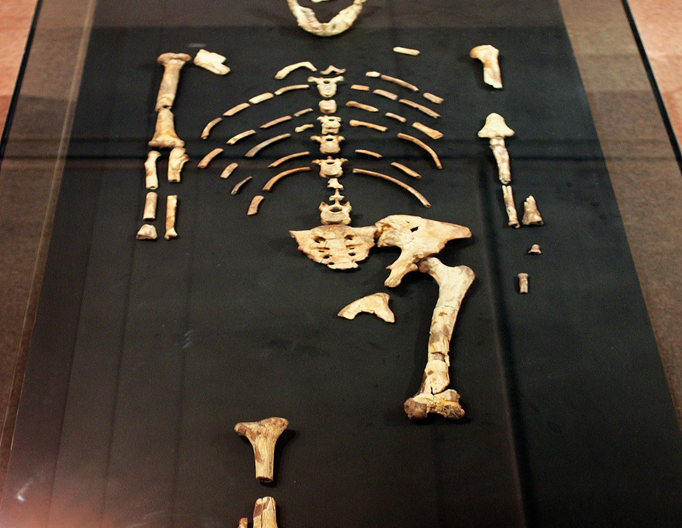
Ethiopia is often referred to as the “Cradle of Humankind” due to its fascinating history, ancient civilization, and jaw-dropping fossil discoveries that changed the perception and understanding of the evolution of humankind and allowed archeologists and scientists to have some clue about the human species; to have a clearer picture on the history of human evolution.
The country is home to several significant archeological findings that give a useful understanding of the history of life on Earth, including the remains of Ardipithecus ramidus, the Homo habilis, and Homo erectus fossils that further trace the trajectory of human development.
What is more, the country is also home to one of the oldest civilizations in the world; with a history that dates back thousands of years.
As the cradle of humankind and the center of ancient civilization, the nation is one of the few countries that attract the attention of archeologists, paleoanthropologists, scientists, and tourists. Among several archeological discoveries Lucy; locally called “Dinkenesh” is one of the discoveries in Ethiopia that gives clues regarding the evolution of humans, and where life and humans came from.
Lucy, scientifically classified as Australopithecus afarensis, was discovered by a team of paleoanthropologists led by Donald Johanson at the known fossils site Hadar, in Ethiopia. The skeleton was notable for its remarkable completeness, with approximately 40 percent of the skeleton being found.
The finding of Lucy`s remaining part was groundbreaking, as it provided tangible evidence that bipedalism, or the ability to walk on two legs, had developed long before the evolution of larger brains. This shifted paradigms, suggesting that walking upright was a crucial adaptation that would lead to our eventual emergence as Homo sapiens.
In the annals of human history, few discoveries have had as profound impact as the finding of “Lucy,” one of the oldest and most complete hominid skeletons ever unearthed. Discovered in 1974 in the Afar State of Ethiopia, Lucy represents a significant milestone in augmenting the understanding of human evolution and amplifying Ethiopia’s reputation as the origin of humankind and a key player in the history of humankind’s history.
Dating back about 3.2 million years, Lucy offered critical insights into the morphology and behavior of early hominids. Standing about 3.5 feet tall and weighing around 65 pounds, she possessed both human-like and ape-like features. Her relatively small cranial capacity pointed to a primitive brain, while her bipedalism showcased an important evolutionary leap toward modern human locomotion.
This year, the discovery of Lucy turns 50. Concerning this, last Tuesday, an anniversary program was held here in Addis Ababa, at Adwa Victory Memorial Museum, to mark the 50th anniversary of the finding of Lucy`s remains under the theme “Half a Century of a Remarkable Finding.”
Including Prime Minister Abiy Ahmed (PhD), and Paleoanthropologist Donald Johanson, who is known for the discovery of the remains of Lucy, the event was attended by several Paleoanthropologists, scientists, and guests among others.
Speaking at the event, Tourism Minister, Amb. Nasise Chali said that the discovery of Lucy’s (Dinkinesh) remains has manifested that Ethiopia is the birthplace of humanity. According to her, Lucy heralded Ethiopia as the origin of Mankind, underscoring the country’s significance in studies of the origin of human fossils. She also said that the discovery of Lucy’s fossil, which was confirmed to have lived on Earth 3.2 million years ago, is a unique historical opportunity.
Amb. Nasise stated that the main purpose of commemorating the 50th anniversary of the discovery of Lucy’s remains is to promote to the world that Ethiopia is the true cradle of humanity. “It is important to show evidence that there are many findings that prove Ethiopia’s land of origin.”
In his short stay with ENA, American Paleoanthropologist Prof. Donald Johanson also underscored that the discovery of Lucy brought a new insight into human evolution. Prof. Donald, who is also known for discovering the remains of Lucy, said that all humans can trace their roots back to Ethiopia, and the slogan “Ethiopia Land of Origin’’ is appropriate.
“I am so happy and so thrilled and so honored to have been invited to give the keynote at this conference, and to be with my colleagues, to have an opportunity to talk about Lucy and how important she has been for our understanding of human evolution and how the spotlight is on Ethiopia. It has a record of fossils from 6 million years ago up to the present. So it is a very important country and helps us understand who we are, where we came from and our place in the natural world,” he stated.
Ethiopia is one of those countries that are so diverse, Prof. Johanson stated, and noted “It has so many things to see. You never run out of places to go or places that will thrill you to spend time here in Ethiopia.”
“I was thrilled to be part of the 50th anniversary of Lucy’s skeletal remains discovery celebrated under the theme ‘Half a Century of a Remarkable Finding’ in Addis Ababa.”
Recalling that there was no huge number of scholars in paleoanthropology during his first visit, Professor Johanson said today there are young Ethiopian scholars who are doing cutting-edge research and making fantastic discoveries.
“I encourage the Ethiopian youth, to get involved in this study of origins, because it’s so important for you to learn more about Ethiopia and teach the world about the importance of this wonderful country,” he urged.
Since her discovery, Lucy has become a symbol of human evolution, capturing the imaginations of scientists and the public alike. Her fossils have been extensively studied, bringing to light various aspects of life millions of years ago, including diet, environment, and social structures.
Indeed, the study of Lucy and her contemporaries has unveiled the complexities of early hominid life, including their adaptation to changing environments and their evolutionary journey toward modern humans.
Lucy herself remains a subject of study and fascination. The original skeleton is housed at the Ethiopian National Museum in Addis Ababa, attracting scholars and tourists alike. In recent years, advanced imaging technologies, such as CT scans and 3D modeling, have allowed scientists to study her remains without physical interference, leading to new insights about her life and environment.
Furthermore, Lucy has transcended the realm of science, becoming a cultural icon. Various exhibitions have showcased her remains in museums worldwide, sparking interest in anthropology and human origins. Documentaries and educational programs have drawn attention to the significance of her discovery, promoting a deeper understanding of our shared history.
Ethiopia, the Origin of Mankind, a country with a rich history and vibrant culture, and the home of Lucy has continued to make strides in various fields, showcasing its greatness on the global stage. The various reforms taken by the government are bearing fruits. From economic growth and infrastructure development to social progress and environmental initiatives, Ethiopia’s current achievements highlight its potential and promise for the future.
BY STAFF REPORTER
THE ETHIOPIAN HERALD FRIDAY 9 AUGUST 2024





